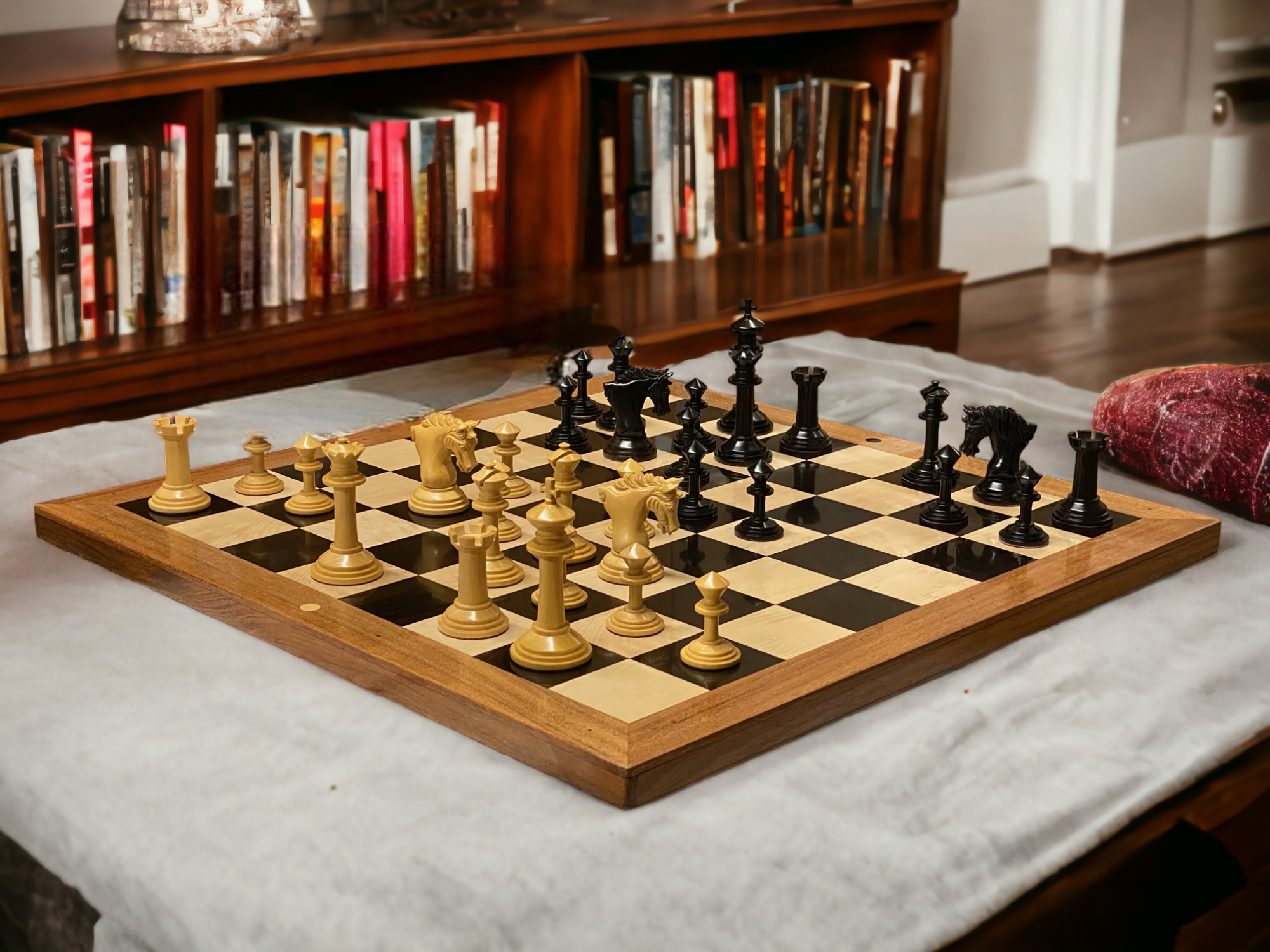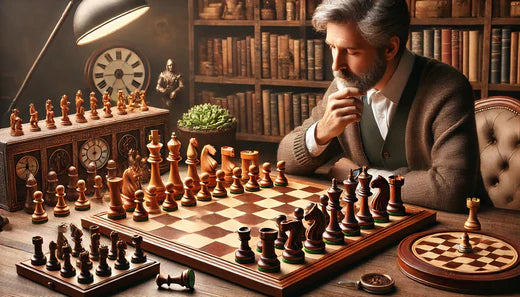Chess is not just a game of moves and strategies; it’s an intricate dance of psychological warfare between two players. The battlefield is a checkered board, and the pieces—especially intricate Ebonised chess pieces—are extensions of the mind itself. Understanding the psychology behind chess can enhance your game and shed light on the behaviours and strategies of players throughout history. In today’s blog, we’ll delve into the psychology of chess, exploring the motivations, mental strategies, and how emotions impact performance.
The Historical Context of Chess Psychology
Chess has a storied history dating back over 1,500 years, originating from ancient India before making its way to Persia, and eventually Europe. In its complex journey, chess has evolved not only as a strategic game but also as a psychological contest. Early chess players recognised the importance of understanding their opponents' states of mind and used various psychological tactics to gain an advantage. The historical context in which chess developed provides the groundwork for examining the mental aspects of the game.
Mind Games and Strategic Thinking
At its core, chess is about strategy. However, it’s not just about the logical execution of moves but also the way players position themselves psychologically. A skilled chess player must anticipate their opponent's reactions and counter their strategies. This anticipatory mindset requires a deep understanding of behaviours, which can be reinforced by playing with visually appealing components like Ebonised chess pieces that often carry a cultural significance, attracting players to their aesthetic qualities while they engage in mental combat.
The Importance of Emotional Control
Another vital aspect of chess psychology relates to emotional regulation. Chess matches can elicit strong emotions, from the thrill of securing a strong position to the despair of making a critical error. A player’s performance is often influenced by their emotional state. Those who can maintain composure and focus are generally more successful. Techniques for emotional control include:
- Meditation: Practicing mindfulness helps players remain calm and centred.
- Deep Breathing: This simple technique provides immediate relief from anxiety during a match.
- Visualisation: By imagining success before matches, players can embed confidence and manage nerves.
Reading Your Opponent: Nonverbal Communication
The ability to read nonverbal cues is a skill that chess players develop over time. The way an opponent sits, their facial expressions, and their pace of play can all provide insights into their mental state. By being observant, players may determine if their opponent is tense, confident, or unsure, adjusting their strategy accordingly. Some techniques for reading opponents include:
- Body Language: Closed body language may indicate discomfort or uncertainty, while open posture can suggest confidence.
- Pacing: A player who takes too long on certain moves may be struggling with the position.
- Eye Contact: Players who avoid eye contact may be feeling insecure about their game.
The Role of Cognitive Biases in Chess
Cognitive biases are mental shortcuts that can affect decision-making and judgement. In chess, these biases can heavily influence a player's performance. Some common cognitive biases in chess include:
- Anchoring Bias: Players may fixate on an early mistake or a poor move, which can skew their perception of the game.
- Confirmation Bias: Some players only focus on information that supports their preconceived notions, ignoring critical aspects of the game.
- Overconfidence Bias: Players may overestimate their skills after winning previous games, leading to careless moves.
Experiencing the Flow State
Many chess players experience a phenomenon known as the ‘Flow State’ during matches. This state of total immersion leads to a sense of effortless control and heightened creativity. Achieving flow involves balancing skill and challenge. As players navigate through difficult positions, their concentration peaks, often resulting in innovative and unexpected moves. To cultivate a flow state, players can:
- Set Clear Goals: Establishing what you aim to achieve in a match provides focus.
- Practice Regularly: Consistent practice enhances skill and increases the chances of achieving flow.
- Eliminate Distractions: Create an environment free from disruptions to maintain mental clarity.
Psychological Profiles of Chess Players
Understanding different psychological profiles of chess players can offer insights into their varying approaches to the game. Players range from aggressive, risk-taking individuals to more conservative strategists. Psychological profiles include:
The Aggressive Player
This type of player enjoys taking risks, often launching unpredictable attacks. They thrive on creating complex positions and are adept at calculating tactics. Their gameplay style often centres on overwhelming opponents with aggressive moves and dynamic placements of Ebonised chess pieces.
The Defensive Player
Conversely, defensive players prioritise stability and control. They prefer to build a strong position and look for opportunities to exploit an opponent's mistakes. Patience is key for these players, and they often excel in positional understanding and long-term strategy.
The Tactical Thinker
Tactical thinkers excel at spotting opportunities for quick gains. They thrive in concrete calculation and are often recognised by their ability to engage in sharp, tactical skirmishes. Their focus on specific moves can create immediate advantages, driving the tempo of the game.
The Impact of Environment on Gameplay
The environment in which a player competes can have a profound impact on their psychological state. Factors such as lighting, noise level, and even the quality of chess pieces can influence concentration levels and emotional well-being. Using well-crafted resources, like beautifully designed Ebonised chess pieces, can create a more inviting atmosphere, enhancing the overall experience. Players often find comfort and confidence when manoeuvring pieces that have a tangible aesthetic appeal.
Competitive Pressure
In competitive settings, the pressure can be overwhelming for players. The stakes during tournaments are high, often leading players to experience stress that can impede performance. Preparing for this pressure involves not only honing skills but also creating a psychological toolkit that includes relaxation techniques and positive affirmations.
The Intersection of Psychology and Game Theory
Chess is deeply intertwined with game theory, a study that explores how individuals make decisions in competitive situations. The strategic elements of chess allow players to examine not only their strategic goals but also the potential reactions of their opponents. Understanding how psychology impacts these decisions can lead to sharper, more insightful gameplay.
Strategies to Enhance Decision-Making
To enhance decision-making skills in chess, players can implement the following strategies:
- Post-Match Analysis: Reviewing games afterward helps players identify weaknesses and strengthen their thought processes.
- Engage in Puzzle Solving: Regularly practicing chess puzzles enhances tactical awareness and decision-making speed.
- Study Classic Games: Analyzing renowned matches helps players understanding diverse strategies employed by top players.
Embracing Community and Learning
Engaging with the chess community provides valuable insights and opportunities for growth, both in terms of skills and psychological understanding. Interacting with fellow enthusiasts can lead to discussions on strategies, mindsets, and experiences, creating an enriching learning environment. Participating in local clubs, online forums, or tournaments can greatly enhance one’s perspective on the psychology of chess.
The Digital Age of Chess
The advent of technology has transformed how chess is played and understood. Online platforms have flooded the chess landscape, allowing players to connect globally. Through these online channels, players can access diverse mindsets and strategies, facilitating an understanding of psychological techniques used worldwide. From analysing famous matches to participating in forums, players can explore and expand their knowledge beyond their immediate circles.
Unlocking Your Chess Potential
Attempting to master chess is a lifelong journey—one that requires not only strategic knowledge but also a profound understanding of the psychology at play. By integrating mindfulness, emotional control, environmental awareness, and community engagement, players can cultivate a more robust and resilient approach to the game. Each match, whether it involves the elegant movements of Ebonised chess pieces or calculated strategies, is an opportunity to learn, adapt, and grow.
In the beautiful complexity of chess lies the power to discover not only the intricacies of the game but also the intricacies of the self. Embrace the mental challenges, the historical context, and the community as you embark on your chess journey, and perhaps you will find more than just a game—you’ll discover a pathway to mastery.
Take a look at another user's Shopify store by clicking here. Please be aware that this is a promotional link, and we cannot be held responsible for the content of the linked store.



